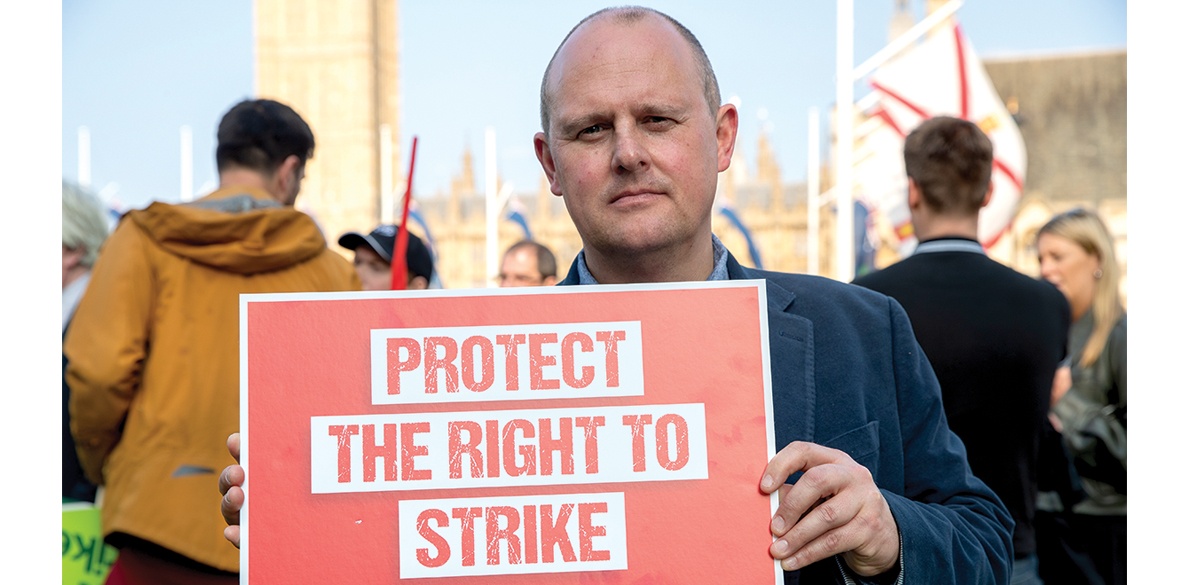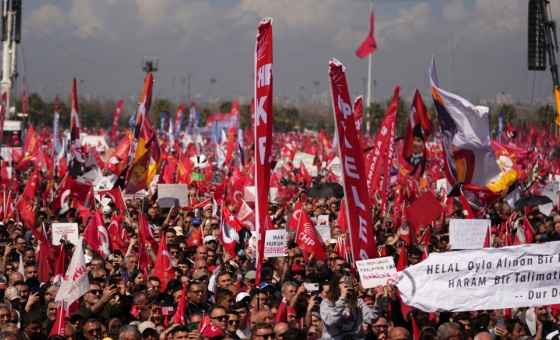This is the last article you can read this month
You can read more article this month
You can read more articles this month
Sorry your limit is up for this month
Reset on:
Please help support the Morning Star by subscribing here
THE Tolpuddle Martyrs’ Festival commemorates the ultimately successful struggle to win freedom for six pioneering trade unionists transported for their collective stand against low pay.
It bears a special relevance in a year when the Tories are intent on new anti-union legislation — pushing the draconian Strikes (Minimum Service Levels) Bill through Parliament to ban effective strike action in whole sectors of the economy.
Despite tussles with the House of Lords, the Tories have the numbers to impose their Bill and it will likely become law in more or less its current shape. How does the TUC plan to resist it?
“First of all, we’ll challenge it in the courts,” general secretary Paul Nowak says. “And we’ll challenge it in the courts on the basis of not just this set of proposals, but the cumulative impact of all these restrictions on the right to strike.
“We think this will put the UK in breach of international law, we’ve had the International Labour Organisation expressing concerns.”
The government has already faced legal setbacks such as this week’s High Court ruling that allowing agency workers to break strikes is illegal.
“So we’ll see the government in court, but I’m absolutely clear that the challenge will then go on to protecting workers.
“Who is going to be the employer who first sacks a nurse or a paramedic or a railway worker or a teacher for exercising their fundamental right to strike?
“I think that will be the point at which there would be a response not just from the individual union but from the whole of the trade union movement.”
Some unions have called for a national demonstration this autumn against the Bill. But Nowak says he’s “not a big fan of the ‘name the date’ call a demonstration” approach.
“We did that on June 18 last year. We had a good turnout — 20-25,000 — but I think the moment that the union movement would mobilise tens of thousands, hundreds of thousands of people against the strikes Bill is when the government tries to use it. So we’ve got to keep our powder dry.
“And we’ve got to avoid walking into a trap set by government — they’ll want to provoke unions.”
With many employers, including in transport, telling ministers they do not want this legislation, Nowak believes the government will find most of them step back from trying to make workers cross their own picket lines.
“But we’re very clear — we’ll defend the right to strike and defend workers who exercise it. I don’t think the movement will stand by and let people be sacked.”
You have a potentially new audience for trade unions this summer, with the highest level of industrial action in decades and many workers having taken strike action for the first time.
Are the traditional highlights of the trade union summer calendar, like this weekend’s Tolpuddle and last weekend’s Durham Miners’ Gala, relevant to a new generation of trade unionists?
“We need to use events like this to celebrate what we’ve done during the year, but also set out what more we need to do.
“Hundreds of thousands of people have been taking strike action, but of course that’s not an end in itself. We need to win.
“We’ve seen some big wins for unions in the private sector. In the public sector, we’ve had to drag government kicking and screaming to the negotiating table, but we’ve made progress even there — in the Civil Service, in the health unions they were told ‘there’s no more money, it’s the pay review bodies or nothing’ – and in both those sectors, government had to move. It wouldn’t happen if people hadn’t stood up, taken action and voted for it.”
It’s true, but even the better offers are below inflation. The British Medical Association, whose junior doctors began another strike this week and which has consultants walking out later this month, has indicated it wants ministers to at least acknowledge the loss of a quarter of their incomes in real terms over the last 13 years and propose a way towards pay restoration. Without such concessions, aren’t below-inflation deals defeats?
“I wouldn’t say defeats, but nobody’s popping champagne corks on the settlements reached in the Civil Service or health service. But we clearly moved government.”
Nowak thinks the battles of the last year have helped unions organise and improve their ability to beat Tory ballot thresholds, putting them in a better position to fight pay cuts going forward.
So we’re not seeing the strike wave recede, with fewer sectors in dispute than a few months ago?
“No. I don’t think you take the health of the movement from who’s taking strike action at any particular time.
“What I would say is that there’s been a whole group of private-sector workers who have taken confidence from the broader struggle.
“Take the ongoing fight in Amazon in Coventry — that turned from a pay dispute into a dispute around union recognition and I’ve got no doubt that despite the union-busting techniques GMB will win recognition at Amazon — and that will plant a big flag in the ground, saying there is no part of the private-sector unions should be afraid of. We can represent workers anywhere.
“Again, just a few weeks ago I was on the picket line with workers from Allied Bakeries in Liverpool, on £11.43 an hour which includes their shift payments, their weekend payments, working bank holidays.
“A group of workers who can’t really afford to go on strike but who are absolutely determined with the support of their union [the BFAWU] that they are not going to accept a real-terms pay cut.
“Would that have happened two or three years ago? Probably not. But people have seen what happened elsewhere and thought, it’s time to take a stand.”
Nowak notes figures on union membership don’t suggest an increase in activity has led to overall increases in membership, and says the “big challenge” for the movement is how to turn the enormous public support we’ve seen for strikes into new union members.
“I don’t want to be part of the leadership of a movement that is managing decline for the next decade. We’ve got to use this opportunity — and the opportunity of a potential incoming Labour government —to rebuild union membership in the private sector.”
Is an incoming Labour government such an opportunity? Labour is studiously ignoring union demands around public ownership of energy and water, has told MPs not to stand on picket lines and even declined recently to say it would match the independent pay review body’s recommendation on teacher pay (which the government has just conceded).
“We will always be pushing Labour to do more, and be more ambitious for working people.
“When it comes to a sector where the market has failed — water is a good example — we’ll keep pushing.
“It was ever thus — I remember in 1997 when I was a regional secretary coming down to London to argue that PFI was not a good way to finance hospitals and schools, that we’d be paying for it long into the future. I hate to say to Labour ‘We told you so,’ but we told them so.
“On the positive side of the accounts, there’s the new deal for workers. Angela [Rayner] has been clear, Keir [Starmer] has been clear at our congress, that this will be delivered within the first 100 days of a Labour government and that is potentially a game changer.
“It doesn’t in and of itself rebuild the trade union movement, but repealing the anti-union laws, employment rights from day one, rights for unions to access the workplace — it’s a pretty comprehensive package of measures and more radical, I think, than anything the 1997 Labour government did to get to grips with Britain’s broken labour market.”
 Ben Chacko
Ben Chacko








